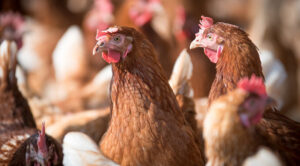
The Association “Union of Ukrainian Poultry Farmers” calls for a moratorium on raising energy tariffs for the duration of martial law, so that the producers of poultry products could maintain the existing production volumes and not raise the prices of poultry products.
The industry association in the message on the site pointed out that the National Commission, which carries out state regulation in the field of energy and utilities (NKREKU) May 31, 2023 approved the decision to cancel the price limits on electricity for businesses from June 30 and released a draft resolution “On establishing the price limits of the market “day ahead”, the intraday market and the balancing market”, which provides for an increase in marginal prices of electricity to industrial consumers from June 30, 2023 by 35%.
“In the structure of the cost of production of poultry, electricity takes from 7 to 12%, and some types of products – up to 30%. (…) Production of poultry consists of different stages and therefore at each stage we will have an increase in the cost of components and respectively the cost of the final products of the industry will grow in “geometric progression”, – explained in the report of the Union of poultry farmers.
The business association points out that an increase in the cost of electricity will have a chain reaction and lead to an increase in the cost of most consumer goods. According to them, the producers will have to transfer the increase of electricity costs to the end users of their products, because “our own reserves for restraining the growth of selling prices have already been exhausted.
The Union of Ukrainian Poultry Farmers also pointed out that starting July 1, 2023, Ukraine is planning to return taxes on fuel to the pre-war level. Accordingly, “absolutely all goods and services that use fuel in the cost of production” will become more expensive.
In addition, the poultry industry will be negatively affected by rising prices of cereals, oilseeds and their processed products, which are the basis of animal feed and the largest share in the cost of poultry production. There will also be the same chain reaction to increase the cost of other components that form the cost of poultry meat and eggs production.
It is obvious that under implementation of the above initiatives the industry will face the consequences of increased energy costs due to the negative changes in the structure of the cost of production in July and in August the producers will have to raise wholesale prices for the poultry products to cover their own production costs, the industry association stressed.
The Poultry Breeders’ Union pointed out that all this is happening against the background of the gradual recovery of the volumes of poultry meat and eggs production, which were considerably reduced last year. At the same time, the industrial poultry sector continues to invest in production.
“The situation with the expected rise in energy costs may not only offset the long-awaited gains, but also return the industry to stagnation and a reduction in the number of poultry kept in agricultural enterprises,” argued the business association.
The report notes that the prices of poultry products are actually tied to the purchasing power of the population, which was and is low. Constant growth of production costs leads to a significant decrease in profitability. The result is a decrease in working capital, reduced competitiveness in foreign markets, unprofitability and reduced production volumes.
“Raising the selling prices of their own products is not a way out of the situation, for producers it is a forced step, because the consequence will always be a decrease in demand for products and accordingly the need for further expansion of production disappears,” – explained the association and called for a moratorium on raising energy tariffs.

The electricity tariff for individual and collective household consumers of 2.64 UAH/kWh including VAT has been set by the Cabinet of Ministers of Ukraine from June 1 to December 31, 2023 inclusive.
This is evidenced by the decree published in the Uryadovyi portal № 544 of May 30, 2023, which amended the decree № 483 of June 5, 2019 on the imposition of special duties on the participants of the electric energy market to ensure the public interest in the process of its functioning.
According to the resolution, the tariff is 2.2 UAH/kWh plus VAT 0.44 UAH/kWh.
As reported, at its meeting on May 30, the government set a flat rate for household consumers at 2.64 UAH/kWh plus VAT. Before that the rate was 1.44 UAH/kWh VAT included for monthly consumption of 250 kWh and 1.68 UAH/kWh VAT included for consumption over this figure. Minister of Energy Herman Galushchenko, commenting the decision, pointed out that the second stage of tariff increase is not foreseen yet. At the same time, he noted that the night tariff, which is 50% of the total, and subsidies to citizens remain.

Industrial enterprises are asking the National Commission for State Regulation in the Spheres of Energy and Public Utilities (NEURC) not to increase the marginal prices (so-called price caps) for electricity on the day ahead market (RDA), intraday market (HRV) and the balancing market to avoid stopping production.
Sources in the market told Interfax-Ukraine that there is a significant possibility of stopping production, in particular, such statements were made on October 12 during a public discussion of the draft decision at the NEURC.
Thus, Alexander Zavgorodniy, Director for Economics and Finance of the Nikopol Ferroalloy Plant (NFP), said that electricity is the main component of the cost of the plant’s products, so the rise in prices will significantly affect the economy of the enterprise.
“Given the likely increase in price caps, rising prices in the electricity market, as well as intentions to increase the cost of transportation and dispatching of electricity, we have decided to stop the operation of the enterprise from November,” the top manager said, adding that the enterprise plans in advance in this case is idle in the winter.
In turn, Oleg Kachko, Deputy Chairman of the Board for Finance of the Zaporozhye Ferroalloy Plant (ZZF), stressed that an increase in price caps will inevitably lead to an increase in electricity prices and, as a result, will lead to an increase in production costs and an inevitable shutdown of the enterprise.
According to him, the increase in price caps will cost the company an additional UAH 1 billion per year. “It is not known where to get these funds, when there are problems with logistics within the country, you need to keep staff, pay salaries. Therefore, in a war, this is not a very right decision,” said the representative of the ZZF.
At the same time, the Dniprozot plant, the only producer of chlorine for Ukrainian water utilities, has been idle since the very beginning of the war. However, due to the technological danger of the production cycle, the enterprise maintains minimal economic activity. However, according to the representative of the company, due to the increase in price caps for electricity costs, Dniproazot will have to stop completely, and the resumption of work will no longer be possible.
The mining industry is also under threat of a complete shutdown. In particular, Alexander Petrovets, Deputy Chief Power Engineer of the Pokrovsky Mining and Processing Plant (PGOK), said that there is a high probability that the enterprise will shut down in November due to an increase in price caps.
“PGOK is a city-forming enterprise, the existence of the city of Pokrovsk depends on our work. We try to work in extremely difficult conditions: the demand for our products is decreasing, the cost of production is growing, there are problems with the purchase of materials for repairs and maintenance of equipment. Therefore, our enterprise can no longer withstand this difficult situation,” the top manager stated.
Vladimir Bodnar, Deputy Chairman of the Board for Economics and Finance of the Marganets GOK (MGOK), recalled that the enterprise is constantly under fire from enemy artillery. However, due to rising costs, the work of the enterprise may stop. “And if price caps rise, then due to the shutdown of a large number of enterprises, there will be no one to sell this electricity to,” Bodnar concluded.